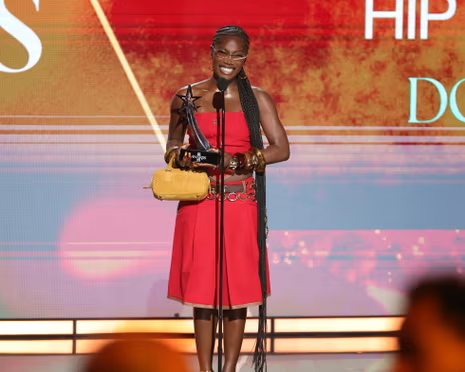Doechii, the Grammy-winning rapper, made headlines this week with a powerful statement during her acceptance speech at the 2025 BET Awards in Los Angeles. While accepting the Best Female Hip-Hop Artist award, she didn’t just thank her fans—she called out the Trump administration for what she described as “ruthless attacks” on communities amid ongoing ICE raids. Her words, delivered with raw emotion, turned a celebratory moment into a rallying cry for justice, resonating with millions as protests erupted across the city. This blog dives into Doechii’s bold stand, the context of her speech, and why her voice matters now more than ever.
Doechii’s BET Awards Moment
On June 9, 2025, Doechii took the stage at the Peacock Theater, her first time attending the BET Awards. After expressing gratitude for her win, she shifted gears, addressing the chaos unfolding outside. Protests had gripped Los Angeles for days, sparked by Immigration and Customs Enforcement (ICE) raids targeting immigrant communities. Doechii didn’t mince words, condemning the deployment of 2,000 National Guard troops and 700 Marines to quell the demonstrations. She questioned what kind of government uses military force against its citizens exercising their right to protest, a sentiment that struck a chord with the audience, earning her a standing ovation.
Her speech wasn’t just a critique—it was a call to action. Doechii highlighted the fear and division caused by the raids, emphasizing the human toll: families torn apart, workers detained, and communities living in fear. By speaking out, she used her platform to amplify the voiceless, a move that’s cemented her as more than a musician but a cultural force.
The Context of Doechii’s Stand
The ICE raids began on June 6, 2025, targeting businesses and neighborhoods across Los Angeles County. By June 9, at least 118 people had been detained, many without warrants, according to local reports. Protesters responded swiftly, blocking freeways and clashing with law enforcement, who used tear gas and flash-bangs to disperse crowds. The Trump administration’s decision to federalize the California National Guard without state approval escalated tensions, drawing sharp criticism from Governor Gavin Newsom and Mayor Karen Bass.
Doechii’s speech came at a pivotal moment. As the BET Awards unfolded, demonstrators were just blocks away, chanting “ICE out of LA.” Her decision to address the issue head-on reflected her commitment to using her art for advocacy. She didn’t stop at criticizing the raids—she stood in solidarity with Black, Latino, transgender, and Palestinian communities, urging unity against hate. This broad coalition of support underscores her understanding of interconnected struggles, making her message both timely and universal.
Why Doechii’s Voice Matters
Doechii, born Jaylah Ji’mya Hickmon, has always been unapologetic. From her breakout hit “Yucky Blucky Fruitcake” to her Grammy-winning album, she’s carved a space in hip-hop as a storyteller who isn’t afraid to challenge norms. Her BET speech is a continuation of that legacy. At 26, she’s part of a new generation of artists who see activism as integral to their craft. By calling out systemic issues on a global stage, she’s inspiring others to speak up.
Her influence extends beyond music. Social media platforms lit up after her speech, with fans and activists praising her courage. Posts highlighted her ability to balance celebration with advocacy, a rare skill in an industry often criticized for staying silent on political issues. Doechii’s words have also sparked conversations about the role of artists in times of crisis, with many arguing that silence is no longer an option.
The Bigger Picture
The Los Angeles protests are part of a larger wave of unrest across the U.S., with similar demonstrations in Chicago, New York, and San Francisco. The raids and military response have raised questions about civil liberties and the militarization of law enforcement. Doechii’s speech tapped into this broader anxiety, asking what kind of democracy suppresses dissent with force. Her question—“What type of government is that?”—is one that resonates far beyond the BET stage.
As the situation evolves, Doechii’s role as a voice for the marginalized will likely grow. Her ability to connect with diverse audiences makes her a powerful advocate in a polarized world. Whether she continues to address these issues through music or public statements, one thing is clear: she’s not backing down.
Stay informed and support artists like Doechii who use their platforms for change. Share your thoughts on her speech in the comments and join the conversation about justice and unity.
